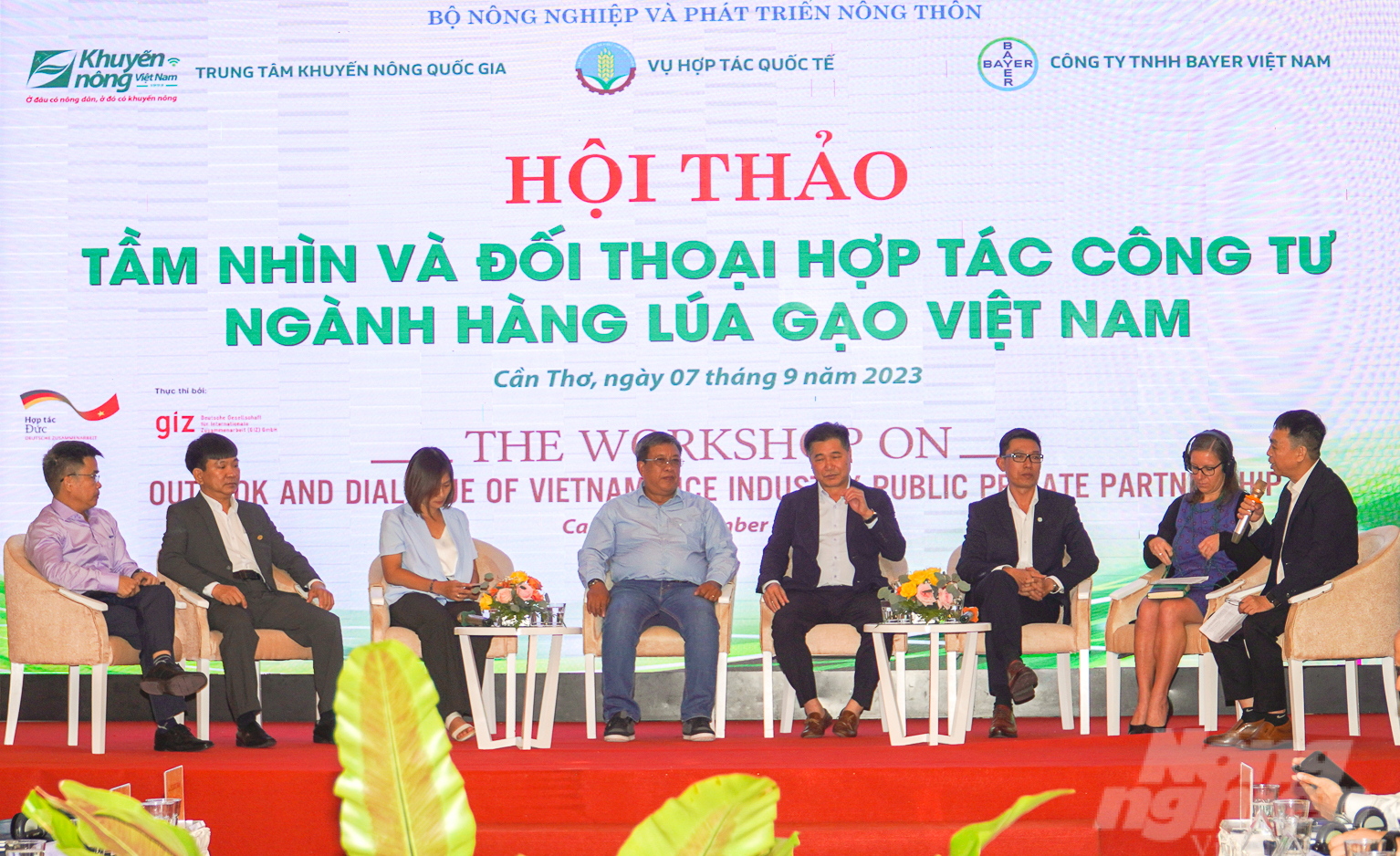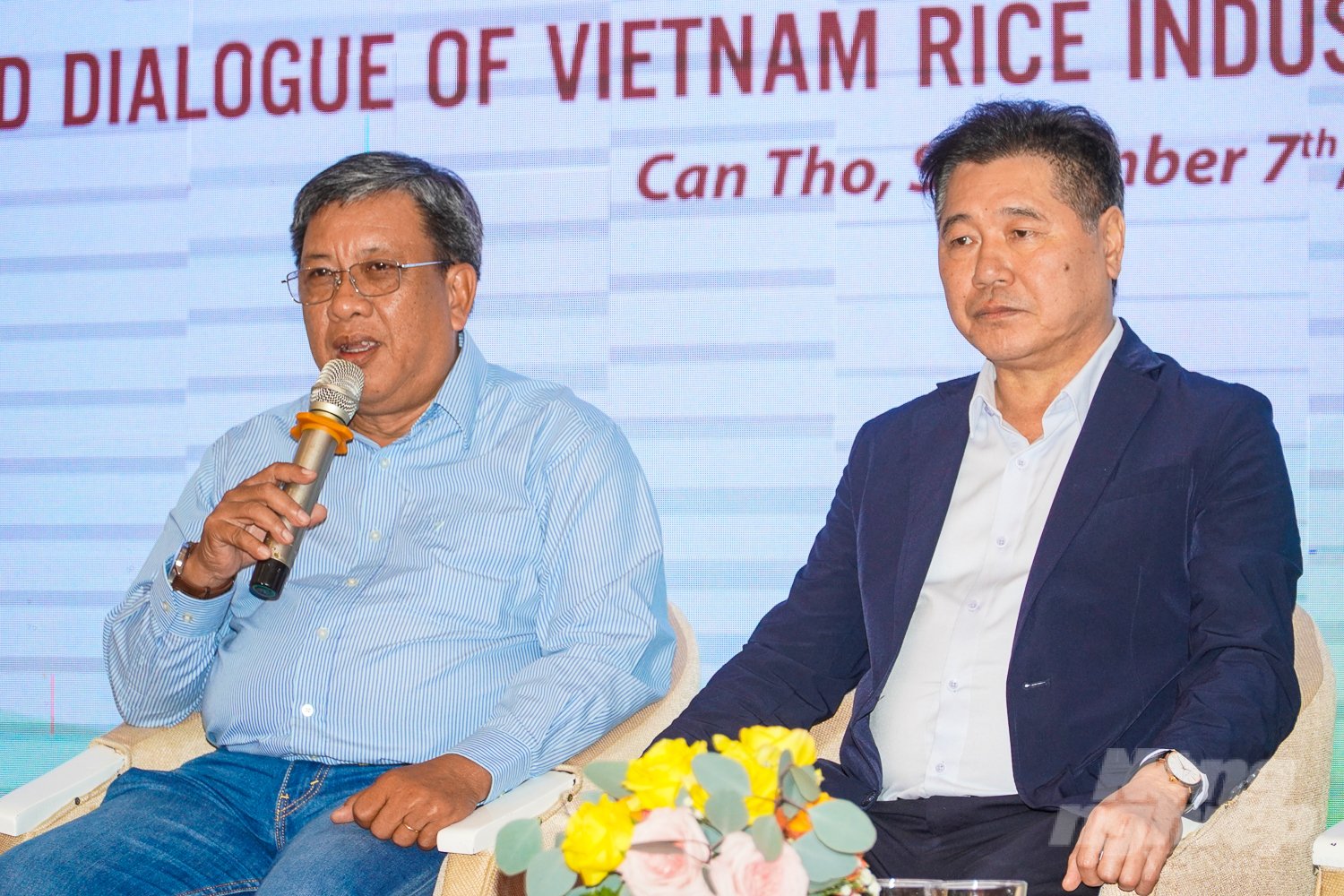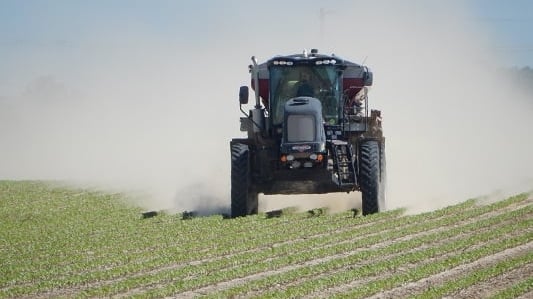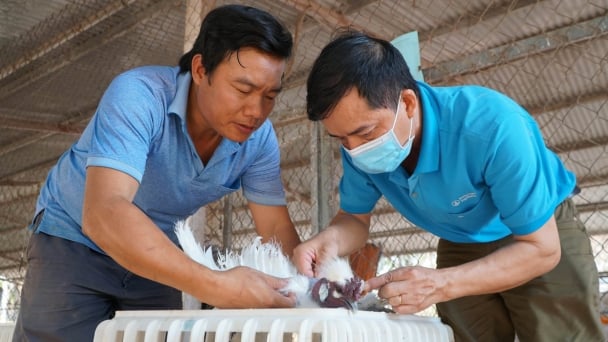May 16, 2025 | 02:44 GMT +7
May 16, 2025 | 02:44 GMT +7
Hotline: 0913.378.918
May 16, 2025 | 02:44 GMT +7
Hotline: 0913.378.918

Experts and businesses discussed at the workshop "Outlook and dialogue of Vietnam rice industry public-private partnership". Photo: Kim Anh.
On September 7 in Can Tho City, the National Agricultural Extension Center, in collaboration with the Department of International Cooperation (Ministry of Agriculture and Rural Development) and Bayer Vietnam Co., Ltd., organized the workshop "Outlook and Dialogue of Vietnam rice industry public-private partnership".
In June 2022, the Ministry of Agriculture and Rural Development issued a decision to establish a Public-Private Partnership Group (PPP working Group) on rice and assigned the National Agricultural Extension Center and Bayer Vietnam Co., Ltd. to co-chair.
Born in a very favorable context when the Mekong Delta rice industry receives many supportive policies, the PPP Working Group carries out the mission of linking sustainable rice production. At the same time, through research activities, trade promotion, and public-private cooperation, agricultural technology can be leveraged to support the activities of the rice industry. Especially participating in the Sustainable Development Project of 1 million hectares specializing in high-quality rice cultivation in the Mekong Delta.
As the "writing" agency for the 1 million hectares of high-quality rice project, Le Thanh Tung, Deputy Director of the Department of Crop Production, emphasized that the PPP Working Group was born before the Project was drafted. The project demonstrates a vision of developments in the rice industry.

Le Thanh Tung (left), Deputy Director of the Department of Crop Production (Ministry of Agriculture and Rural Development), welcomed all components in the rice value chain to participate in the 1 million hectares of high-quality rice project. Photo: Kim Anh.
Tung welcomed all components in the rice value chain to participate in the 1 million hectares of high-quality rice project with many different angles, fields, and programs, especially businesses. Because the 1 million hectares of high-quality rice project is large-scale, accounting for 70% of the rice cultivation area in the Mekong Delta. The project received great expectations from the Government, the Ministry of Agriculture and Rural Development, and localities in the Mekong Delta, as well as farmers with the common goal of increasing people's income, reducing greenhouse gas emissions, and adapting to climate change.
However, Tung wondered that in recent times, businesses have implemented many farmer support programs but mainly focused on individual farming households. Meanwhile, the 1 million hectares of high-quality rice project focuses on cooperatives and organizations representing farmers. Support programs that benefit individual farmers may have "the opposite effect" compared to participating in cooperatives.

8 collectives and 2 individuals with outstanding achievements in organizing the Agritechnica Asia Live 2022 event received certificates of merit from the Ministry of Agriculture and Rural Development. Photo: Kim Anh.
Therefore, Mr. Tung hopes that in public-private cooperation programs, businesses or independent investors in the rice industry chain will agree that there is a solution to link farmers into an organization. position.
In addition, when deployed, technical factors also need to be consistent with the goal of the 1 million hectares of high-quality rice project, targeting social, humane, and environmental factors.
Finally, close cooperation must be established between businesses and public-private organizations with central and local agricultural extension agencies.
Determining the 1 million hectares of high-quality rice project as a great opportunity to reposition Vietnam's rice industry, Le Quoc Thanh, Director of the National Agricultural Extension Center, plans for the coming time and the enterprise agricultural extension system. Industry must be a part of Vietnam's agricultural extension. Thanh commits and looks forward to the contributions of businesses and public-private organizations to create a positive solution to support the 1 million hectares of high-quality rice project.
At the same time, the National Agricultural Extension Center will activate the agricultural extension system, including enterprise agricultural extension, agricultural extension of social organizations, and grassroots agricultural extension to accompany each other to meet the set goals.

The National Agricultural Extension Center and BioPlant Company (Korea) signed a cooperation agreement at the workshop. Photo: Kim Anh.
Vietnam is considered to have the most robust agricultural extension system in Southeast Asia, with more than 30,000 local agricultural extension staff and the most substantial public investment in the agricultural extension system.
Chu Viet Ha, Director of the Crop Science Branch (Bayer Vietnam Co., Ltd.), said combining businesses in the same agricultural industry to share vision and goals is necessary. According to Mr. Ha, no business has enough technology to help farmers from planting to harvesting and consumption.
Wanting to develop sustainable agriculture, forcing businesses to cooperate and promote each other's strengths, each unit contributes to the value chain to produce standard, sustainable farming models, aiming to increase the value of Vietnamese rice grains.
On this occasion, the Conference awarded certificates of merit from the Minister of Agriculture and Rural Development to 8 groups and two individuals who had outstanding achievements in organizing the Agritechnica Asia Live 2022 event.
Translated by Tu Quyen

(VAN) Vietnam's draft amendment to Decree No. 156 proposes a mechanism for medicinal herb farming under forest canopies, linking economic development to population retention and the sustainable protection and development of forests.

(VAN) In reality, many craft village models combined with tourism in Son La have proven effective, bringing significant economic benefits to rural communities.

(VAN) The international conference titled Carbon Market: International experiences and recommendations for Vietnam was successfully held recently in Ho Chi Minh City.

(VAN) According to the Project on rearranging provincial and communal administrative units, in 2025, the country will have 34 provinces/cities, 3,321 communes, wards, and special zones, and no district-level organization.

(VAN) The vice president of fertilizer with Stone X Group says the Trump administration’s tariffs are impacting fertilizer markets.

(VAN) Resolution 57 offers Vietnam a significant opportunity to narrow the global genetic technology disparity and convert its extensive genetic resources into commercial advantages.

(VAN) The Ministry of Agriculture and Environment will prioritize the implementation of five core and breakthrough solutions in science and technology, in addition to the seven groups of tasks identified in Decision No. 503.